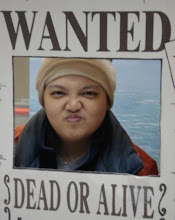Remember, remember...the fifth of November; The gunpowder treason and plot. I know of no reason why gunpowder treason should ever be forgot. Aaaahhh yes...the Guy Fawkes rhyme. According to the movie's website, Guy Fawkes, or Guido Fawkes, was a key participant in the so-called "The Gunpowder Plot", an attempt to blow up the British Parliament and overthrow the government of King James I. The plot, suppose to be carried out on on November 5, 1605, failed. Caught, Fawkes and other conspirators were hung, drawn and quartered. At present, bonfires were lit across London and the UK every November 5th to commemorate the failed attempt to topple the government.
Set in totalitarian Britain, a "terrorist" who goes by the name of "V" dares to defy the leadership of the Chancellor. Dressed as a futuristic Fawkes, he challenges the authority of the government and vows to blow up the Parliament on November 5th; this would end the government's tyranny and grant freedom to the people. While on "patrol", he rescues Evey, a mild-mannered girl who works at the government controlled television station, from a bunch of corrupt police. From there, they developed a deep relationship that will eventually shape the rest of the film. The movie was based on the 1980's comics with the same name and was brought to the big screen by the creators of the Matrix Trilogy (the Wachowski brothers were fans).
I enjoyed the film due to the acting and the dialogues (unfortunately, our copy of the DVD was...eh-hem...hence, we were robbed of enjoying the movie's settings). Hugo Weaving, wearing a mask throughout the film, was excellent; the mask proved not to be an impediment for him to clearly articulate V's charisma, wit and contempt. Plus, the mask was...uh, creepy in a way, but as the movie progressed, his manner of conveying V's principles made it seem alright or acceptable. Meanwhile, Natalie Portman, effectively showed us her transition from a naive young lady to a woman without fear. Though there is still room for improvement on her accent, her beauty did not overpower Weaving's ominous character; it was quite a match, really.
The movie had its share of violence (the fight scenes were COOL), but it lacked any sex scenes (though that scene with a Bishop was eerie...you'll find out), which was alright. At times, sex scenes are necessary; however, too much of it distracts people from appreciating the real purpose of the film. In the Philippines, it serves as a gimmick to draw crowds in the moviehouses. The plot was contemporary, and some elements are similar to George Orwell's 1984 (John Hurt was menacing as the movie's "Big Brother"); but of course, the ending was another thing.
People may interpret the movie differently, but for me, I was moved by V sentiment's and understood Evey's fear. One of the most memorable lines in the movie was: "People should be not afraid of their government; governments should be afraid of their people". How interesting. I am generally peaceful person (as fierce as an mushroom), but the movie question's our preference to use either violent or peaceful means to gain one's desires, in this case, freedom (in the Philippines, its a corrupt-free government). Its a case to case basis, I think because using violence will not make things better than it was (Its a lot faster than negotiations...
pero). But one thing's for certain: oppression must not make us fearful and weak, it should make us stronger and undaunted. Overcoming your fear will set you free. Watch the movie, it will set you free. ;)

Hugo Weaving as "V" and Natalie Portman as "Evey" Source: http://vforvendetta.warnerbros.com














